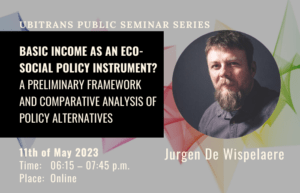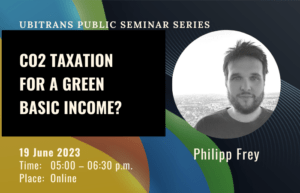UBI and Social-Ecological Transformation (UBITrans)
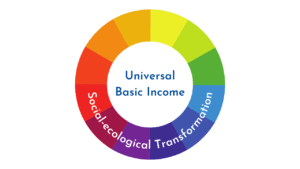
Universal basic income and the social-ecological transformation: do they go together?
In the face of climate change, increasing social inequality, the rise of new populisms and the spread of COVID-19, unconditional basic income is now discussed more than ever. May universal basic income help to remedy what has been diagnosed as a multidimensional crisis of capitalism? Could basic income put an end to growth-dependency of contemporary capitalist economies and lead towards more sustainable trajectories? Or may it simply reinforce neoliberal growth scenarios and lead to radical individualism?
Our approach and our goals
Given the social and political urgency of the issues at hand, we aim to address these questions and contested issues around the relationship between universal basic income and the social-ecological transformation via a series of talks and interactive debate. This series will integrate perspectives from economics, sociology and psychology as well as from civil society movements and politics.
The series will ask whether universal basic income would enable the (much needed) social-ecological transformation. It will look at both the powers and limitations of a universal basic income to affect the social and cultural transformation of contemporary capitalist societies, while taking account of a variety of potential scenarios from green growth, post-growth to degrowth.
Online lecture series starting as off June 2022
The online series (potentially hybrid later on) will start as off June 2022. Speakers will be announced soon. The series will shed light on the role of the state (e.g. macro-economic policy, financing, the citizen-state relationship, and the acceptance of social-ecological reforms) as well as the role of actors (production and consumption patterns) and subjectivities (habitus transformation) in the process of the social-ecological transformation.
Publications
Ketterer, H. (2021). Living differently? A feminist-Bourdieusian analysis of the transformative power of basic income. The Sociological Review. 69(6):1309-1324. (considered for journal article of the year price in 2021; ranked as “highly commended” article)
Güntert, S., Wehner, T., Mieg, H. (2022). Volunteer work: Organizational, motivational, and cultural contexts of volunteering. Springer Briefs in Psychology. (pp. 50 Swiss militia system)
Ketterer, H. & Becker, K. (2023). Qué falla en la democracia?: un debate entre Klaus Dörre, Nancy Fraser, Stephan Lessenich y Hartmut Rosa. Barcelona: Herder, Editorial.
Schachtschneider, Ulrich 2023: Ecological Eurodividend. Ein Schritt zum Grundeinkommen in Europa. In: Lüdemann,Otto/ Neumärker, Bernhard/ Schachtschneider, Ulrich: Grundeinkommen braucht Europa – Europa braucht Grundeinkommen (Hg.) 2023
Howard, Michael W./Pinto, Jorge/ Schachtschneider, Ulrich 2023: Ecological Effects of Basic Income. In: The Palgrave International Handbook of Basic Income. Palgrave Macmillan UK. 2nd Edition 2023.
Schachtschneider,Ulrich 2023: Grundeinkommen als (große) Transformation. In: Neumärker/Schulz (Eds.): Basic Income and Development, Proceedings of the FRIBIS Annual Conference 2022
Schachtschneider,Ulrich 2022: Grundeinkommen: Ein gastliches Umfeld für Postwachstum? In: Neumärker/Schulz (Eds.): Financial Issues of a Universal Basic Income Proceedings of the FRIBIS Annual Conference 2021
Schachtschneider,Ulrich 2021: The Ecological Euro-dividend: A Step towards Basic Income in Europe. In Green European Foundation (Ed.): European Green Perspectives on Basic Income Vol.II, 2021
UBITrans Public Seminar Lectures
17th November 2022: Mikael Malmeus - Situating Basic Income In Two Future Post Growth Scenarios
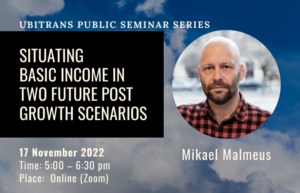
Abstract: How well a universal basic income (UBI) would fit into a post growth economy depends a lot on assumptions about the core characteristics of such an economy. Comparing UBI in a “local self-sufficiency” economy to a UBI in an “automation” economy, we show that the impact of a UBI would differ greatly between these contexts. Our analysis shows that a UBI is less compatible with a labor-intensive local self-sufficiency economy than a capital-intensive, high tech economy. We conclude that the feasibility and attractiveness of a UBI depends greatly on the specific characteristics of the economy.
12th December 2022: Ina Praetorius - Freiheit in Bezogenheit lernen. Ohne BGE - Oder besser: Mit BGE
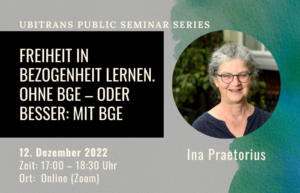
Abstract: Dass „Freiheit“ nicht die sterile Selbstbezogenheit des „homo oeconomicus“ meint, müssen wir in Zeiten des Klimakollaps sowieso lernen: Alle Menschen sind geboren, verletzlich, sterblich, abhängig von der Natur und voneinander. Das BGE wäre eine große Unterstützung in diesem notwendigen Lernprozess. Denn es nimmt die Angst um die eigene Existenz. Und es befreit dazu, neue freie Formen der Bezogenheit und der Gegenseitigkeit zu erfinden und auszuprobieren.
6th February 2023: Frank Schulz-Nieswandt - Sozialstaatskulturen und Sozialcharakter: Psychodynamische Grundlagen von Solidaritätsverständnissen
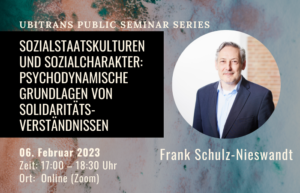
Abstract: Wohlwissend, dass der bundesdeutsche Sozialstaat in verschiedenen Teilbereichen unterschiedlichen Gerechtigkeitskonzepten folgt und daher in der kritischen Reflexion einer differenzierten Vorstellung von Solidarität bedarf, wird die Analyse in einem ersten Schritt zugespitzt auf die Idee der unbedingten Solidarität im Lichte anthropologisch fundierter rechtsphilosophischer Überlegungen über eine responsive Gabe, das Gegeben-Sein des Anderen, die Unbedingtheit der Würde und die relationale Autonomie. In einem zweiten Schritt werden die psychodynamischen Grundlagen einer kulturellen Grammatik des Miteinanders als Miteinanderfreiheit in Miteinanderverantwortung skizziert. Mit diesem Blick auf die Herausbildung eines prosozialen Sozialcharakters wird in einem dritten Schritt deutlich, dass eine kritische Theorie der Möglichkeit eines Gestalt-wahren Lebens in einer unwahren Welt nicht ohne Psychoanalyse der Subjektivierungsformen auskommt.
27th February 2023: Ronald Blaschke - Emanzipatorisches Grundeinkommen und Postwachstumsgesellschaft
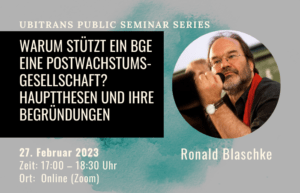
Abstract: Am Montag, dem 27. Februar 2023, hält Ronald Blaschke einen Abendvortrag zu „Emanzipatorisches Grundeinkommen und Postwachstumsgesellschaft“. Im Vortrag soll begründet werden, warum ein emanzipatorisches Grundeinkommen eine Postwachstumsgesellschaft befördern kann. Dazu werden mehrere Thesen zur Diskussion gestellt. Eingangs erfolgen Begriffsklärungen.
20th April 2023: Alexander De Roo - Grundeinkommen - Immer wichtigerer Bestandteil grüner Politik?
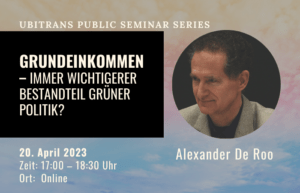
Abstract: Fast alle grünen Parteien in Europa haben sich für eine Art Grundeinkommen ausgesprochen. Schon dreimal war das Grundeinkommen Bestandteil der Verhandlungen bei der Bildung einer Regierung in den Niederlanden. Der Streit um Klimapolitik und Naturschutz wird noch viele Jahre brauchen, um erfolgreich zu sein. Eine Einführung von Grundeinkommen hilft, dem zentralen Anliegen grüner Politik, da die unteren Schichten der Gesellschaft dann keinen finanziellen Stress mehr haben und sich auch grün engagieren würden. Ein aktives Werben für Grundeinkommen durch grüne Parteien ist notwendig um eine Volkspartei zu werden.
11th May 2023: Jurgen De Wispelaere - Basic income as an Eco-Social Policy Instrument? A Preliminary Framework and Comparative Analysis of Policy Alternatives
Abstract: For decades basic income has been hailed as an eco-friendly policy and concurrently Green Parties in Europe and elsewhere are amongst its staunchest political supporters. In recent years, basic income has come under attack from a number of policy competitors that all claim to be the real drivers of eco-social policy reform. These include: participation income, universal basic services, job guarantee programs, and forced reduction (and redistribution) of labour time through four-day work week programs. Despite a number of obvious synergies, each of these policies are typically pitched as direct competitors to the basic income proposal. The eco-social state debate has adopted a strong zero-sum approach in which we are forced to opt for one policy and ditch the others, as opposed to thinking the eco-social state as a policyscape in which a mix of different policies might be the optimal scenario. In this presentation I am more interested in exploring the comparative advantages for each of these proposals. To do so I propose to first set out a framework for the comparative analysis of competing eco-social policy proposals. Next I apply this framework briefly to examine the relative merits of basic income over its main competitors. Finally, I reflect on the need to rethink the debate on eco-social policy reform as a positive-sum game featuring a mix of various policy instruments.
19th June 2023: Philipp Frey - CO2 taxation for a green basic income?
Abstract:
For many years, CO2 taxation has been seen by economists who rely on market-based solutions as a key means of combating climate change. At the same time, it is well known that consumption-based taxes hit households at risk of poverty particularly hard. Thus, taxation that appears to make ecological sense threatens to become yet another inflationary driver, placing an economic burden on those who have contributed and are contributing far less to climate change than wealthy and affluent households. Against this background, the demand to redistribute the revenues from CO2 taxes as a kind of climate money enjoys great popularity. A corresponding design is intended to help reconcile social sustainability and an ecological steering effect. However, it can also be an entry project into an unconditional basic income. The lecture will illustrate the distributional effects of such a CO2 taxation to show that it represents a policy to set massive incentives in the sense of ecological sustainability and at the same time to fight poverty radically on a national, European and global level.
Research Team
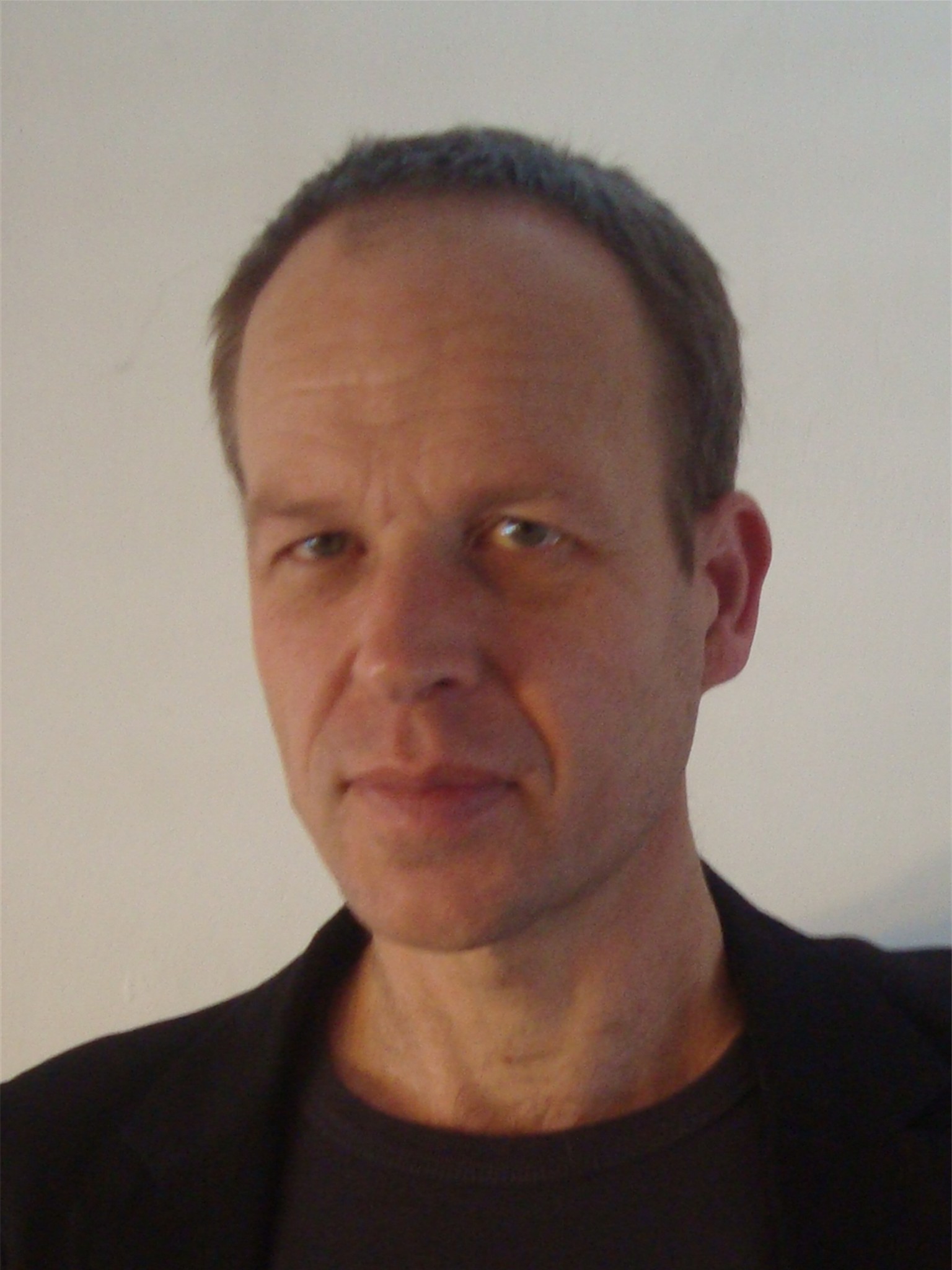
Dr. Ulrich Schachtschneider
studied energy engineering, sociology and environmental policies and is working as energy consultant and freelance social scientist. His research fields are social-ecological transformation, sustainability and modern society, and policies of “Degrowth”. He is member of board of Unconditional Basic Income Europe (UBIE) and advocating for an “Ecological Basic Income”. Lives in Oldenburg, Germany.
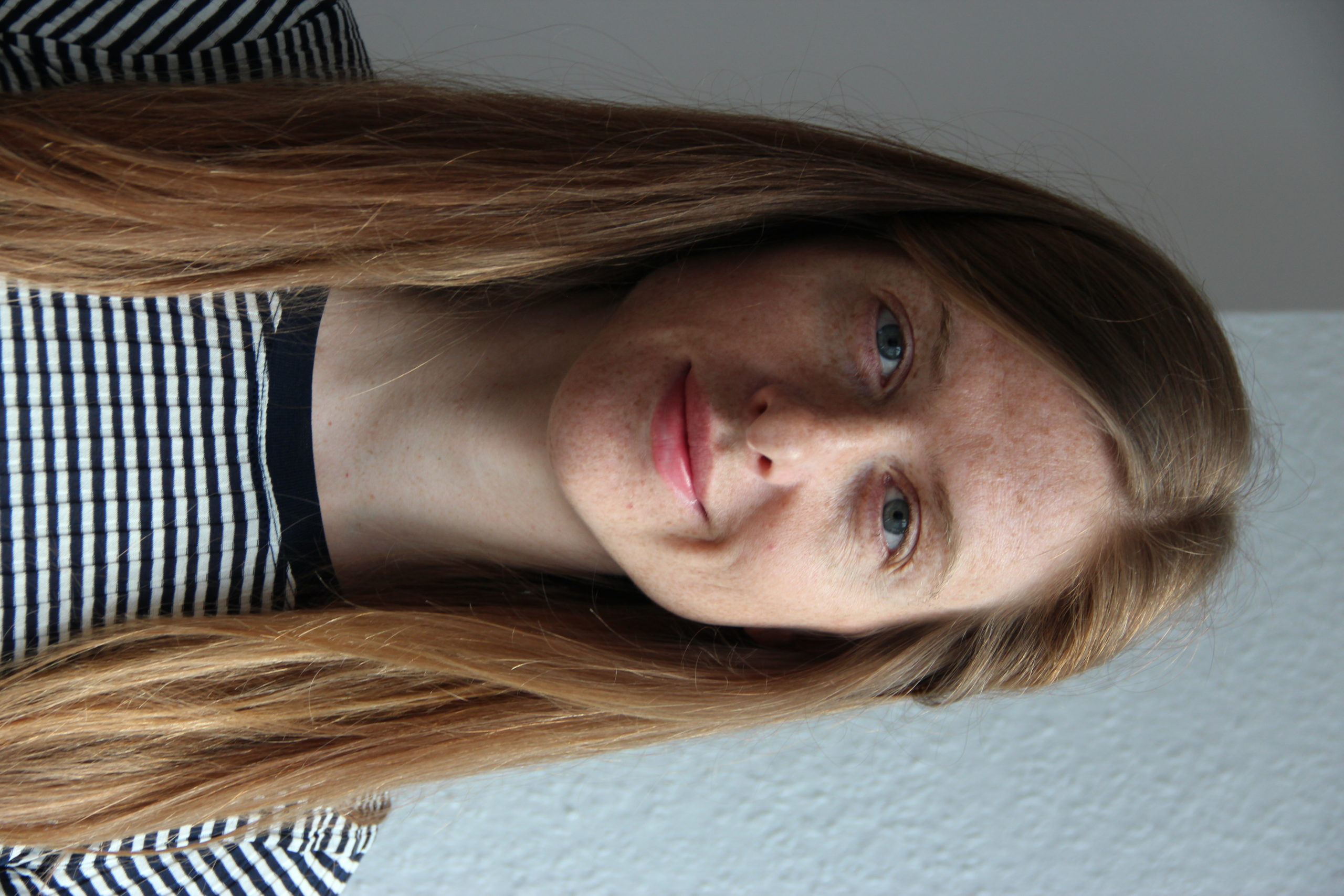
Hanna Ketterer
is a sociologist based at Jena University. Her research focuses on basic income’s potential to transform the capitalist way of life centred around paid work and employment. In her work, she integrates Bourdieu’s practice theory, feminist perspectives and gift theory. Her phd is based on a multi-sited ethnography on decoupling income from labour examining the day-to-day practices of rentiers, communards and pensioners. Hanna holds a BA in European studies from the University of Maastricht and a
MPhil in Sociology from the University of Cambridge. She has worked at the DG Employment, Social Affairs and Inclusion of the European Commission in Brussels, at the ETH Center for Occupational Studies and at the DFG-research group on post-growth societies at Jena University. She is associated member of the collaborative research centre Structural Change of Property.
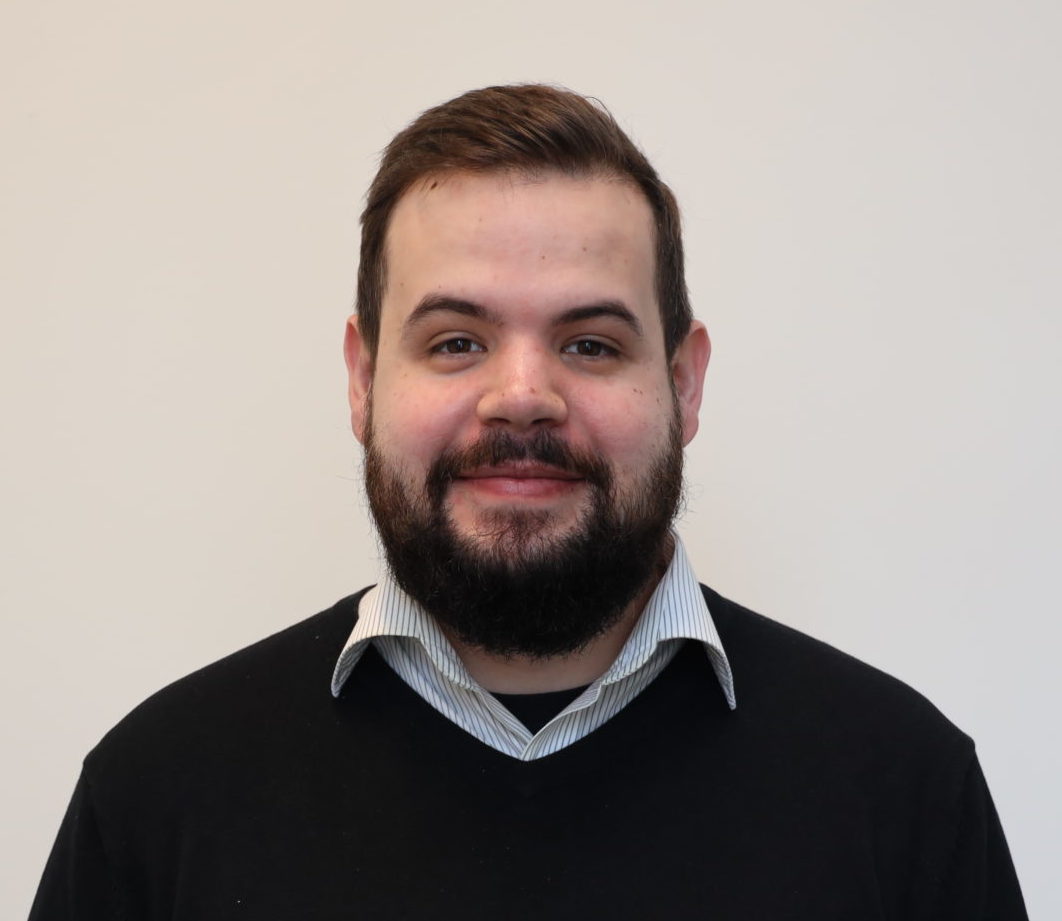
Dominik Schröder
is a PhD student at the Götz Werner Professorship at the University of Freiburg and tutor for economic policy. His focus is on the connection between UBI, digitalization and socio-ecological transformation. He has been working on concepts for an integrated, efficient and sustainable energy supply and storage in the Upper Rhine region within the RES-TMO project.
FRIBIS Team Koordinator
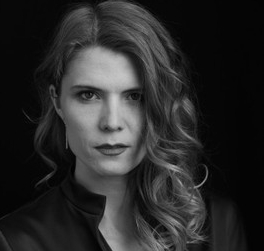
Dr. Bianca Blum
is a Post-Doc researcher and Lecturer at the Götz Werner Chair of Economic Policy and Constitutional Economic Theory, University of Freiburg in Germany. Her research interests centre on the political economy of sustainability, rebound effects, empirical method application and experimental design, regulation and taxation as well as the political economy of reforms. She worked on interdisciplinary research projects such as the Suslight project and the RES_TMO project with focus on energy efficiency improvements and energy consumption.
Transfer Team

Adrienne Goehler
is in series: graduate psychologist | President of the University of Fine Arts in Hamburg | Senator for Science, Research and Culture of Berlin | Curator of the Hauptstadtkulturfonds | Fellow IASS Potsdam. Today she is simultaneously: freelance publicist and curator | theorist and activist Unconditional Basic Income | initiator and artistic director EXAMPLES TO FOLLOW! expeditions in aesthetics and sustainability | Affiliate Fellow at IASS Potsdam
